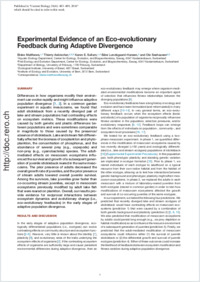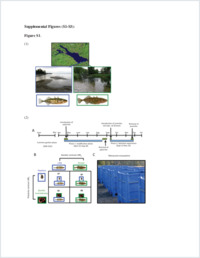Experimental evidence of an eco-evolutionary feedback during adaptive divergence
- Matthews, Blake Aquatic Ecology Department, Center for Ecology, Evolution, and Biogeochemistry, Eawag, Kastanienbaum, Switzerland
- Aebischer, Thierry Fish Ecology and Evolution Department, Center for Ecology, Evolution, and Biogeochemistry, Eawag, Kastanienbaum, Switzerland - Department of Biology, University of Fribourg, Switzerland - Institute of Ecology and Evolution, University of Bern, Switzerland
- Sullam, Karen E. Aquatic Ecology Department, Center for Ecology, Evolution, and Biogeochemistry, Eawag, Kastanienbaum, Switzerland - Zoological Institute, University of Basel, Switzerland
- Lundsgaard-Hansen, Bänz Fish Ecology and Evolution Department, Center for Ecology, Evolution, and Biogeochemistry, Eawag, Kastanienbaum, Switzerland
- Seehausen, Ole Fish Ecology and Evolution Department, Center for Ecology, Evolution, and Biogeochemistry, Eawag, Kastanienbaum, Switzerland - Institute of Ecology and Evolution, University of Bern, Switzerland
-
22.02.2016
Published in:
- Current Biology. - 2016, vol. 26, no. 4, p. 483–489
eco-evolutionary dynamics
ecological speciation
adaptive divergence
rapid evolution
ecosystem
stickleback
English
Differences in how organisms modify their environment can evolve rapidly and might influence adaptive population divergence [1 and 2]. In a common garden experiment in aquatic mesocosms, we found that adult stickleback from a recently diverged pair of lake and stream populations had contrasting effects on ecosystem metrics. These modifications were caused by both genetic and plastic differences between populations and were sometimes comparable in magnitude to those caused by the presence/absence of stickleback. Lake and stream fish differentially affected the biomass of zooplankton and phytoplankton, the concentration of phosphorus, and the abundance of several prey (e.g., copepods) and non-prey (e.g., cyanobacteria) species. The adult-mediated effects on mesocosm ecosystems influenced the survival and growth of a subsequent generation of juvenile stickleback reared in the same mesocosms. The prior presence of adults decreased the overall growth rate of juveniles, and the prior presence of stream adults lowered overall juvenile survival. Among the survivors, lake juveniles grew faster than co-occurring stream juveniles, except in mesocosm ecosystems previously modified by adult lake fish that were reared on plankton. Overall, our results provide evidence for reciprocal interactions between ecosystem dynamics and evolutionary change (i.e., eco-evolutionary feedbacks) in the early stages of adaptive population divergence.
- Faculty
- Faculté des sciences et de médecine
- Department
- Département de Biologie
- Language
-
- English
- Classification
- Biological sciences
- License
-
License undefined
- Identifiers
-
- RERO DOC 259394
- DOI 10.1016/j.cub.2015.11.070
- Persistent URL
- https://folia.unifr.ch/unifr/documents/304843
Other files
Statistics
Document views: 127
File downloads:
- pdf: 263
- Supplementary material: 117
- Data: 47


